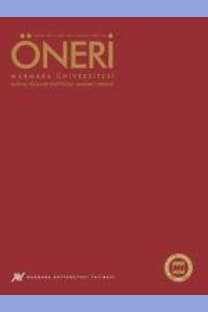KONTROL ODAĞI VE ÖRGÜTSEL MUHALEFET ARASINDAKİ İLİŞKİ ÜZERİNE BİR ARAŞTIRMA
Bu çalışmada çalışanların iş çevrelerindeki kontrol algılarının (kontrol odağının), örgütle ilgili anlaşmazlıklarını ve karşıt fikirlerini sözlü olarak ifade etme stratejileri (örgütsel muhalefet) ile ilişkisinin incelenmesi amaçlanmıştır. Bu amaçla, İstanbul’da çeşitli sektörlerde faaliyet gösteren firmalarda çalışan 180 beyaz yakalı çalışandan toplanan veri analiz edilmiştir. Elde edilen sonuçlar, çalışanların kontrol odaklarının yapıcı açık muhalefet, dışsal muhalefet ve sorgulayıcı açık muhalefet ile ilişkili olduğunu göstermektedir. Kontrol odağı yapıcı açık muhalefeti ve sorgulayıcı açık muhalefeti negatif yönde açıklamakta, dışsal muhalefeti ise pozitif yönde açıklamaktadır. Bu sonuçlar, dışsal kontrol odağına sahip çalışanların dışsal muhalefet yapmaya eğilimli olup, yapıcı ve sorgulayıcı açık muhalefet yapmaktan kaçındıklarını göstermektedir. Kontrol odağı daha içsel kontrole doğru gittikçe çalışanlar yapıcı ve sorgulayıcı açık muhalefet yapmaya daha çok eğilimli olup, dışsal muhalefet yapma olasılıkları azalmaktadır.
A RESEARCH ON THE RELATIONSHIP BETWEEN LOCUS OF CONTROL AND ORGANIZATIONAL DISSENT
In this study, the relationship between the control perceptions of the employees in their work environment (work locus of control) and their strategies while expressing their disagreement or contradictory opinions about organizational policies and practices (organizational dissent) is examined. For this purpose, data collected from 180 white-collar employees working in different industries in Istanbul has been analyzed. The results indicate that work locus of control of the employees related to constructive articulated dissent, displaced dissent and questioning articulated dissent. Work locus of control explained the variance in constructive articulated dissent and questioning articulated dissent in the negative direction, and displaced dissent in positive direction. These results suggest that employees with external locus of control are prone to displaced dissent, refrain from making open a constructive and questioning articulative dissent. Moreover, when locus of control moves towards internal from external control, employees are more prone to use constructive and questioning dissent strategy, and their probability to use displaced dissent strategy decrease.
